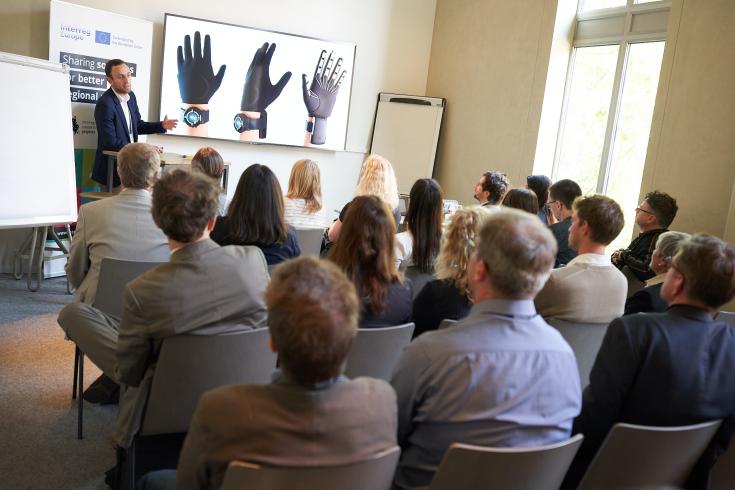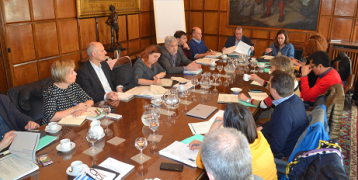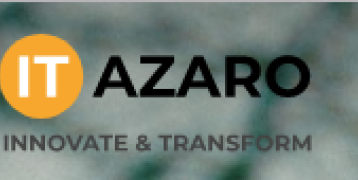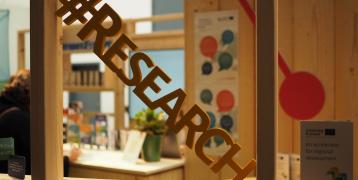From S3 priority selection to actions

On 1 June 2023, the Policy Learning Platform organised a matchmaking on S3 priority selections and actions for the benefit of The Province of East Flanders.
The Province of East Flanders is designing and implementing its Smart Specialisation Strategy (S3) for the programming period 2021-2027. The selected regional S3 priorities are bioeconomy/cleantech, materials, smart logistics, agrifood, health tech, all things digital and smart logistics. The Province of East Flanders aims to gain knowledge on how to identify emerging opportunities from the selected regional S3 priorities and how to develop the right granularity of actions.
Beneficiary:
- Nicolas Moerman, Province of East Flanders, Belgium.
Peer experts:
- Harri Kuusela, Regional Council of Päijät-Häme, Finland.
- Luc Hulsman, SNN, Northern Netherlands.
- Maria Goulaptsi, Region of Central Macedonia, Greece.
- Peter Grant, WSX Europe, United Kingdom.
- Sami Perälä, Seinäjoki University of Applied Sciences, Finland.
Policy learning platform experts:
- Marc Pattinson, Policy Learning Platform
- Arnault Morisson, Policy Learning Platform
- Laura Varisco, Policy Learning Platform
The peers discussed the importance of inclusive and continuous entrepreneurial discovery process (EDP) and multi-level governance :
Some regions are adopting challenge-driven S3 to address regional societal challenges (see below the example of the city of Sofia).
This shift offers the opportunity to build new governance arrangements. For instance, the region of Castilla y León, Spain, has adopted new Entrepreneurial Discovery Process (EDP) mechanisms for the development of transformative challenges and working groups to promote flagship initiatives in an open public-private partnership framework.
Developing institutional capacities for effective S3 governance is a continuous process that requires time. Building long-term trust, enabling learning mechanisms, and retaining the right persons with strong knowledge of the regional institutional context are necessary enabling factors for developing institutional capacities for effective S3 governance. It is essential to have operational teams consisting of competent staff to support the implementation of policies and strategic initiatives.
Regions must select relevant key performance indicators to assist in piloting progress.
These indicators can be shared with the regional innovation actors to foster a ‘unity of purpose’, particularly regarding the regional strategic S3 priorities (see the good practice Transparent Presentation and Communication of Innovation Projects Funded by ERDF in Asturias, Spain).
Regional animators can be identified and ‘contracted’ to handle certain parts of the EDP. For example, cluster managers can play an important role in engaging SMEs and larger companies in the EDP process.
The EDP process can also be a way of identifying new and perhaps more risky priorities that can represent new regional growth opportunities (see for instance the wild-card strategy in North Portugal).
Quantitative tools such as Social Network Analysis or patent analysis can support regional policymakers to map and identify central innovation actors (see for instance the Platform RIS3CAT in Catalonia, Spain). Additionally, the concept of economic relatedness reveals that new industrial sectors for a region emerge from the pre-existing regional industrial sectors. It provides a strong quantitative analytical tool to select the industrial sectors to prioritise.
In BEYOND EDP, the good practice Identification of the Regional Specialisation Pattern provided an objective basis for the selection of the priorities using 3 dimensions (economic, scientific and technological). Quantitative data were used to guide thematic working groups in the identification of new technological domains. This approach has been particularly well deployed in the Region Centre Val de Loire in France.
The peers and moderators discussed Interreg Europe projects and their good practices, namely:

Ambition Research Development 2020

RIS3 One Stop Liaison Office: supporting the Innovation and Entrepreneurship Ecosystem

Cross-Border Smart Specialisation Strategy of Galicia – Northern Portugal (RIS3T)

RIS3CAT (Catalonian RIS3) Monitoring System

Metropolitan Strategy of Economic Development

Multilevel governance in RIS3 Basque Country

Deployment of a sub regional s3 by means of offering advanced innovation services to local SMEs and

Smart Specialisation Strategy
In this policy brief, you will learn from practices implemented in different regional institutional contexts such as transformative policy changes on regional policy challenges ranging from the Entrepreneurial Discovery Process to S3 Monitoring.

Clusters: Driving the green and digital twin transition
Clusters play an important role in industrial transformations as they support knowledge diffusion, knowledge spillovers, higher innovation and more. Explore the importance of clusters in this policy brief.
Regional innovation governance
Discover five policy recommendations using the experience of Interreg Europe projects to inspire policymakers to adopt more effective regional innovation governance.
University-industry collaboration
Find out in this policy brief why university-industry collaboration is a key component of the regional innovation policy-mix. Successful exploitation of research and development results is fundamental for regional competitiveness.
Multi-level Governance for Innovation
Discover how regions across Europe have been using multi-level governance to promote innovation.

The entrepreneurial discovery process – The S3 engine
Discover more about the entrepreneurial discovery process. A bottom-up approach to reveal what a region does best in terms of its science and technology.

Innovation Inducement Prizes: small steps to transformative changes
There is a growing consensus that innovation policies need to be directed toward addressing societal challenges like climate change,

Hackathons and challenge prizes: key learnings
On 17 May 2023, the Policy Learning Platform held a webinar on the topic of Hackathons and Challenges Prizes.




